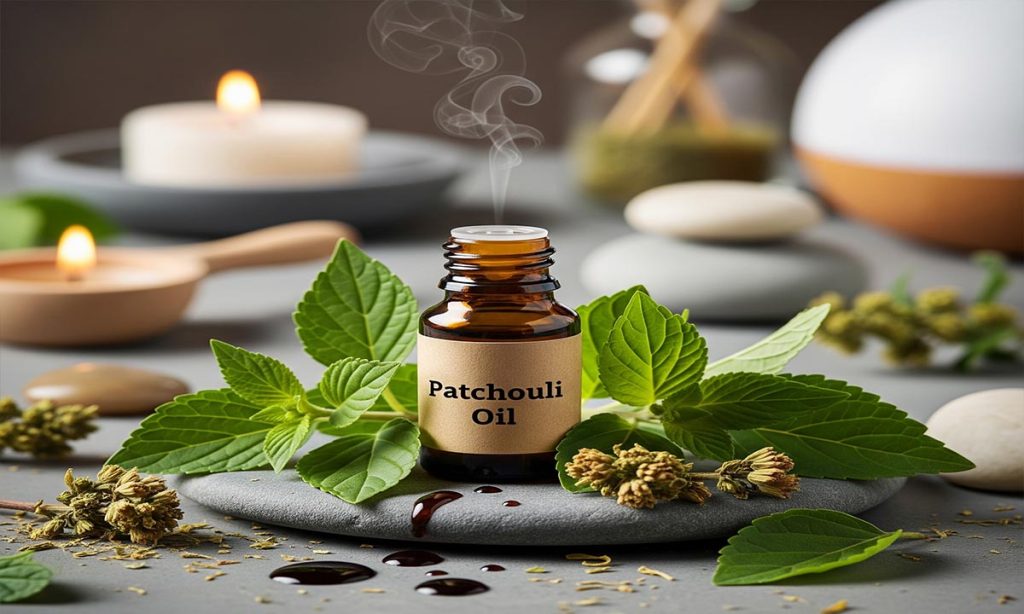Patchouli oil is an essential oil extracted from the leaves of the patchouli plant (Pogostemon cablin). Native to Southeast Asia (Indonesia, India, the Philippines, Malaysia), this oil has a deep, woody‑spicy scent and appears dark amber or brown. Its distinctive fragrance – often described as strong, earthy, sweet, and spicy – has made patchouli oil a common ingredient in perfumes, incense, soaps, and aromatherapy blends. For centuries it’s been used in patchouli perfume oil formulations and incense for its rich aroma. Today, patchouli essential oil is prized in skincare, aromatherapy, and household products. In this guide, we explain what patchouli oil is, what it’s good for, and its uses, benefits, and side effects.

Patchouli plant (Pogostemon cablin) with aromatic leaves used to produce patchouli essential oil. Patchouli oil is produced by steam distillation of the plant’s dried leaves and stems. The oil is rich in patchoulol (a sesquiterpene alcohol) and related compounds. These natural constituents give patchouli oil its therapeutic qualities. The plant’s bushy green leaves are fermented, dried, and distilled to extract the oil. Because of its potent aroma and fixative properties, patchouli oil is widely cultivated in Indonesia (Sumatra, Sulawesi), India, and other tropical countries.
Uses of Patchouli Oil
Patchouli essential oil has a variety of uses in cosmetics, wellness, and household products. Some common uses include:
- Skincare: Added to creams, lotions, and body oils to soothe the skin and moisturize dry areas. It is used in soaps (patchouli oil soap) and body oil blends for its fragrance and potential skin-healing effects.
- Hair care: Blended into shampoos and scalp oils to help with oily scalp and dandruff issues. Patchouli body oil (diluted with carrier oils) can nourish the scalp.
- Aromatherapy: Diffused as a patchouli aromatherapy oil to promote relaxation and emotional balance. Its warm scent is believed to calm nerves, reduce stress, and improve mood.
- Perfumes and fragrances: Used as a base note in perfumes and scented products (patchouli oil perfume) because the scent lingers and blends well with florals and woods. It is also used in incense, air fresheners, and detergents for its lingering aroma.
- Medicinal uses: In traditional medicine, patchouli has been used for colds, headaches, nausea, and skin infections. It has antiseptic and antifungal properties and can help cleanse minor wounds.
- Insect repellent: Applied to repel insects. Studies show patchouli oil is toxic to mosquitoes, house flies, and ants, acting as a natural insecticide.
- Flavoring: In some cultures, it has been used in very low concentrations to flavor candies, teas, and other foods.
Perfumes and Fragrances
Patchouli’s rich scent makes it a fixture in perfumery. Patchouli oil is often blended into perfumes and personal-care products (lotions, colognes) as a base or fixative. Its deep, musky aroma (sometimes described as “patchouli oil smell”) anchors floral and citrus top notes. In modern fragrance making, patchouli oil (or synthetic patchouli perfume oil) is prized for its longevity.
Soap, Skin Care, and Body Oils
Patchouli oil is frequently added to soaps, creams, and massage oils for its scent and skin benefits. As a patchouli body oil (diluted in carrier oil), it can hydrate dry skin and may improve conditions like acne and eczema by reducing inflammation. Its antiseptic qualities have led to uses in natural deodorants and antiseptic creams. You’ll find patchouli in many DIY skincare recipes (patchouli acne spot treatments, lotions, body mists) for this reason.
Aromatherapy and Relaxation
In aromatherapy, patchouli oil is used to promote relaxation and mental wellness. Its earthy, grounding aroma helps reduce stress and anxiety. Inhalation of patchouli oil has been shown to lower cortisol (the stress hormone) in some studies. Practitioners recommend patchouli aromatherapy oil for evening baths, diffusers, or massage blends to help unwind. For example, diffusing a few drops of patchouli with lavender or cedarwood can create a calming spa-like atmosphere.
Insect Repellent and Household Uses
Patchouli oil’s natural insect-repellent properties make it useful around the home. It can deter mosquitoes, termites, ants, and fleas. Adding a few drops to cleaning solutions or fabrics was a traditional way to ward off pests (even used in laundry and bedding). Patchouli oil is also used in incense and candles to freshen spaces and neutralize odors.
Benefits of Patchouli Oil
Patchouli oil offers several potential health and therapeutic benefits, many of which are supported by preliminary research or traditional use. Some notable benefits include:
- Anti-inflammatory effects: Patchouli oil contains compounds (like patchoulol) that suppress inflammation. Research in animals and cells shows it can reduce swelling and inflammatory markers. For example, one study gave patchouli oil to rats with colitis and found reduced intestinal inflammation. This suggests patchouli may help soothe inflamed skin conditions or joint pains, though more human studies are needed.
- Pain relief: Linked to its anti-inflammatory action, patchouli extract also showed analgesic (pain-relieving) effects in animal tests. It helped mice tolerate pain better after oral administration, indicating patchouli oil might ease aches (e.g. headache, muscle soreness) when used topically or aromatically.
- Antimicrobial and antifungal: Patchouli oil is known to inhibit certain bacteria and fungi. Laboratory studies found it disrupts biofilms of Staphylococcus aureus (even MRSA) and can inhibit growth of yeast like Candida albicans. These antimicrobial properties mean patchouli oil can help prevent or slow infection in minor cuts and may balance skin microflora, making it useful in natural deodorants, acne treatments, and home disinfectants.
- Skin health and healing: Rich in antioxidants and anti-inflammatories, patchouli oil can support skin repair. A study showed topically applied patchouli oil reduced UV-induced skin aging in mice (less wrinkles, more collagen). Anecdotally, it may help calm redness, heal chapped skin, and fade scars. It’s often used in serums and balms for sensitive or troubled skin. For acne or eczema, patchouli’s soothing effects and antimicrobial action can help clear blemishes and reduce irritation.
- Stress relief and mood enhancement: Patchouli’s earthy aroma is grounding. In aromatherapy, it is valued for reducing stress and anxiety. Studies have shown inhaling oil can lower stress hormones and improve subjective calmness. Many people find patchouli fragrance “uplifting” or stabilizing; it was a staple in 1960s and 70s counterculture for this reason.
- Digestive support (traditional): Historically, patchouli tea or extracts were used to soothe nausea and indigestion. Modern science has not confirmed a strong effect, but it’s sometimes included in herbal digestive blends. A small rat study found inhaling patchouli did not actually reduce food intake or weight, so any appetite-control benefit is likely minimal.
Overall, patchouli oil’s benefits span from skin and mood to household health. As one market analysis notes, its many “therapeutic benefits” have boosted its use in skincare, massage oils, and aromatherapy. Its soothing scent may help relieve tension and depression, making it popular in stress-relief rituals.
Side Effects and Precautions
Patchouli oil is generally safe for most people when used properly, but there are a few side effects and precautions to keep in mind:
- Skin sensitivity: Undiluted patchouli oil can irritate sensitive skin or cause an allergic reaction in rare cases. Always dilute it in a carrier oil (1–5%) before topical use. Perform a patch test on a small area (inside forearm) and wait 24–48 hours to check for redness or rash.
- Blood-thinning effects: Patchouli oil can potentially affect blood clotting. People taking blood-thinning medication (like warfarin) or those with bleeding disorders should avoid using patchouli oil. It’s also wise to stop using it a week before any major surgery to prevent excess bleeding.
- Not for ingestion: Never drink or swallow patchouli essential oil. Essential oils are highly concentrated and can be toxic if ingested without medical supervision.
- Inhalation caution: While diffusing patchouli can be relaxing, prolonged inhalation without breaks may cause headache, nausea, or dizziness in some people. When using in a diffuser or steam inhalation, do so in a ventilated room and limit sessions to 20–30 minutes at a time.
- Pregnancy and children: There is limited research on this oil during pregnancy or breastfeeding. As a general rule, pregnant or nursing women and young children should use essential oils only under professional guidance.
- Eye/ear contact: Avoid getting this oil near the eyes, inner ears, or mucous membranes, as it may cause irritation.
In summary, use patchouli oil with care. Dilute properly, do a patch test, and avoid if you have bleeding issues. If any irritation or adverse reaction occurs, discontinue use.
How to Use Patchouli Oil Safely
To safely incorporate patchouli oil into your routine, follow these best practices:
- Dilute before use. Mix patchouli oil with a carrier oil (such as jojoba, coconut, or sweet almond oil) for any skin application. A general guideline is 1–3% dilution (about 1–3 drops of patchouli oil per teaspoon of carrier oil) for adults. For sensitive skin or facial use, aim for 0.5–1% dilution.
- Do a patch test. Before widespread use, apply a diluted drop of patchouli oil to the inside of your forearm or behind your ear. Cover it with a bandage or cotton ball and wait 24–48 hours. Check for any redness or itching. This ensures you don’t have an unexpected reaction.
- Diffuser and inhalation. To enjoy patchouli aromatherapy, add a few drops to a diffuser or a bowl of hot water. Breathe deeply but take breaks every 20–30 minutes to avoid overstimulation. Always use essential oil diffusers in well-ventilated areas and never leave them running unattended.
- Blending oils. Patchouli oil blends beautifully with other essential oils. Common pairings include lavender, bergamot, frankincense, sandalwood, and citrus oils. In a diffuser or massage blend, combining patchouli with these oils can enhance its calming, earthy notes.
- Product use. You can also buy prepared products containing patchouli (soaps, lotions, incense, perfumes). Check that the concentration is appropriate for topical use and be aware of any additional ingredients.
Always store patchouli oil in a dark, cool place to preserve its potency. If using it for the first time or on sensitive areas, err on the side of higher dilution. Following these guidelines helps you benefit from oil while minimizing any risk.
FAQs
Q: What is patchouli oil used for?
A: Patchouli oil has many uses. It’s used in skincare products (creams, soaps, body oils) to moisturize and soothe skin. It’s a popular aromatherapy oil for stress relief, added to diffusers or bath soaks for its calming scent. In perfumery, it acts as a base note in fragrances and incense. It’s also used as a natural insect repellent and in household cleaners for its antiseptic qualities.
Q: What are the benefits of patchouli essential oil?
A: Patchouli oil offers anti-inflammatory, antibacterial, and antifungal benefits. It may help calm skin irritation (like acne or eczema) and promote healing. Many people find its aroma reduces stress, anxiety, and improves mood. Some studies suggest patchouli can relieve pain and reduce swelling. It’s also used to balance oily skin or scalp and to freshen indoor air naturally.
Q: Are there any side effects of patchouli oil?
A: Side effects are rare but possible. It can irritate sensitive skin if undiluted, so always mix it with a carrier oil and test a small patch first. It may act as a mild blood thinner, so people on anticoagulant meds or with bleeding disorders should avoid it. Inhaling very high concentrations (with no breaks) could cause headache or nausea. Never ingest patchouli oil. Pregnant women and young children should use it only under professional advice.
Q: How do I use patchouli oil?
A: Use This oil topically or by inhalation. For skin, dilute it (1–2% in carrier oil) and apply to problem areas or massage into skin. For aromatherapy, add a few drops to a diffuser or warm bath. You can also add patchouli to bath soaps or body lotions for a fragrant soak. Always follow dilution guidelines: 1 drop of patchouli per teaspoon of carrier oil for general use. Perform a patch test (apply diluted oil to inner forearm and wait 24 hours) before extensive use. When diffusing, run for 20–30 minutes and ventilate the room to prevent nausea.
Q: What does patchouli oil smell like?
A: Patchouli oil has a deep, earthy aroma. It’s often described as musky, sweet, and spicy with strong woody notes. Some say it smells mossy or reminiscent of damp forest. This rich scent has made it a classic fragrance ingredient.
Q: Can patchouli oil help with acne or eczema?
A: Yes, many people use it l to help with acne and eczema. Its anti-inflammatory and antibacterial properties can soothe irritated skin and reduce blemishes. It also helps balance skin’s natural oils. Patchouli oil is often found in acne creams and eczema ointments. To use for skin issues, dilute a drop or two of patchouli oil in a teaspoon of carrier oil and apply it to the affected area.
Conclusion
Patchouli oil (patchouli essential oil) is a versatile and aromatic natural oil valued for both its fragrance and its therapeutic properties. It can be used in many ways – from perfumery (patchouli perfume oil) and incense (patchouli oil incense) to skincare (soaps, lotions) and aromatherapy (patchouli aromatherapy oil) – to harness its benefits. Its key benefits include anti-inflammatory and antimicrobial effects, skin healing, and stress relief. However, it must be used with care: always dilute it, do a patch test, and heed precautions (e.g. avoid if on blood thinners).
Whether you’re drawn by the exotic scent (often called the “patchouli oil smell” or “fragrance”) or by its holistic benefits (what patchouli oil is good for), this oil has much to offer. If you choose to use patchouli oil, do so mindfully and enjoy its unique earthy essence.
Have you tried this oil? Share your experience or favorite patchouli uses in the comments below, and feel free to share this guide with friends looking to learn about the benefits of patchouli !
Sources: Information above is drawn from authoritative health and botanical sources, including peer-reviewed studies and expert reviews. Each claim is backed by research and reputable references as cited.





